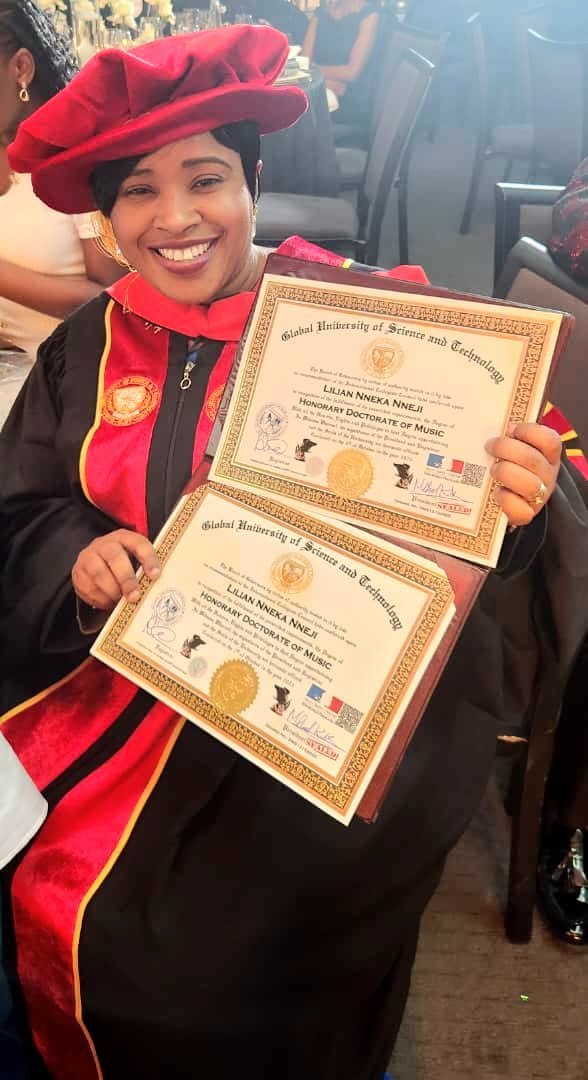In a notable milestone for Nigerian gospel music, Lilian Nneji, a celebrated artist and minister, has received an Honorary Doctorate in Music from the Global University of Science and Technology, located in Delaware, United States. This recognition shines a spotlight not only on Nneji’s enduring impact as a gospel musician but also on the broader significance of gospel music within Nigeria, West Africa, and the global music community.
The honorary degree, dated October 5th, was conferred upon Nneji based on the recommendation of the institution’s International Collegiate Council. According to an official statement from the university, this special recognition applauds Nneji’s unwavering work in advancing gospel music and her powerful role in inspiring spiritual growth through her ministry. The university cited her consistency, creativity, and ability to foster faith as core reasons for the award.
Receiving this honour, Nneji publicly expressed her heartfelt gratitude, attributing her accomplishments to divine guidance and persistent hard work.  “For me, it is simply an honour God himself orchestrated,” she noted warmly in her acceptance. “Indeed, hard work pays and patience is a virtue everyone must have. The grace of God brought me this far.”
“For me, it is simply an honour God himself orchestrated,” she noted warmly in her acceptance. “Indeed, hard work pays and patience is a virtue everyone must have. The grace of God brought me this far.”
Nneji’s sentiments echo a familiar refrain among Nigerian creatives: success in the arts is seldom a straight road. For many in the gospel music scene, particularly women artists, perseverance amid societal expectations and industry hurdles is essential. As she described, her journey has been shaped by a profound connection to her faith—a connection she believes is essential to her continual motivation and creative output. “The love and knowledge of God are what keep driving me to do what I do,” she stated.
Spotlight on a Gospel Trailblazer
Well known for her energetic and uplifting song Meriwo, Meriwo, Nneji’s music has influenced not only local audiences in Nigeria but also gospel lovers across West Africa and the African diaspora. Her distinctive style—combining traditional rhythms, powerful vocals, and contemporary gospel elements—has made her both a fan favourite and a role model for up-and-coming artists.
According to Abuja-based cultural analyst Adebayo Salami, “Lilian Nneji’s recognition on the global stage is a clear testament to the evolution of Nigerian gospel music. Her award brings deserved visibility to artists who diligently combine storytelling, faith, and indigenous music traditions.”
Inspiration for a New Generation
Nneji utilized the occasion to address aspiring gospel musicians, particularly the next generation across Nigeria and Africa at large. Emphasizing the importance of resilience and spiritual truth, she advised: “To the younger generation who do what I do, I would say—always remember that God is in the journey. Trust the process.”
Her encouragement highlights a key theme in Nigeria’s thriving gospel sector: the need for patience and dedication, as the music industry grows increasingly competitive both at home and abroad. According to recent reports (Musicians Union of Nigeria, 2023), gospel music contributes significantly to industry revenues, with digital streaming and live events surging in popularity. Despite these gains, many artists still grapple with resource constraints, limited access to international platforms, and the challenge of balancing artistic integrity with commercial success.
Gospel Music’s Growing Influence in Nigeria and Beyond
Nigeria’s gospel music continues to capture hearts across Africa and worldwide. Acts like Sinach, Nathaniel Bassey, Frank Edwards, and now Lilian Nneji are consistently charting in Africa’s top gospel playlists and filling venues from Lagos to London. Their influence is visible not just in music, but in social initiatives, charity concerts, and faith-based youth empowerment schemes.
Comparatively, Ghana’s gospel industry has also expanded, with artists like Joe Mettle and Diana Hamilton gaining regional and global nominations. However, Nigerian gospel music often leads in innovation and international collaborations, according to Lagos entertainment correspondent Ijeoma Okafor. She observed, “Nigerian gospel musicians set a pace that others aspire to. Awards like this for Lilian Nneji are more than personal milestones—they ripple out, encouraging the entire region.”
Challenges persist, however. Industry voices point to issues such as copyright protection, insufficient investment in local talent development, and limited access to export pathways for African gospel artists hoping to tour abroad. Nonetheless, advocates maintain that the global recognition of artists like Nneji signals greater things to come.
The Role of Faith and Cultural Identity
For many Nigerians and Africans, gospel music is more than entertainment—it’s a vital part of cultural and spiritual identity. Churches, local events, and radio stations alike continue to feature gospel tracks, using music to foster hope, solidarity, and resilience amidst challenges. This rich tradition is one reason why global awards conferred on artists like Nneji resonate deeply across West African societies.
Cultural sociologist Dr. Fatai Adeoye of the University of Lagos commented, “The worldwide appreciation for Nigerian gospel is a reflection of how music bridges our shared history, faith, and aspirations. Recognition like this honours not only the artist, but the communities and traditions that have supported her career.”
Looking Forward: The Path for Gospel Artists
Nneji’s honorary doctorate joins her growing list of achievements, reinforcing her status as a prominent and dedicated figure in the Nigerian gospel landscape. Her continuing success serves as a beacon for African artists—especially women—pursuing careers in a sector that is both artistically rewarding and socially influential.
As digital media transforms the reach of African music, and as international recognition becomes increasingly attainable, the future is bright for gospel musicians who combine skill, authenticity, and purpose. Lilian Nneji’s story is an example of how faith, determination, and cultural rootedness can propel African artists onto the world stage.
What does this recognition mean for the future of gospel music in Nigeria? Will it inspire even more artists to aim higher and push the boundaries on the world stage? Share your thoughts and join in the conversation below.
For general support, contact support@nowahalazone.com.
Want more uplifting stories and music news? Join our community on Facebook, X (Twitter), and Instagram for all the latest updates.
What’s your view on Lilian Nneji’s achievement and the impact of gospel music in Nigeria and beyond? Drop your comments below and be part of the conversation!










